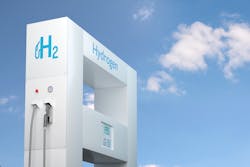SoCalGas and CTE Deploy First of 15 Hydrogen Fuel Cell Electric Delivery Vans
Southern California Gas Co. (SoCalGas) and the Center for Transportation and the Environment (CTE) have partnered to deploy the first of 15 total hydrogen fuel cell electric vehicle (FCEV) medium-duty delivery vans to replace diesel-powered vehicles and reduce greenhouse gas emissions.
A courier service is responsible for driving the hydrogen FCEV vans to facilitate package deliveries in underserved communities within the Inland Empire.
The project team retrofitted and converted diesel delivery vans to a hybrid electric drive that includes on-board hydrogen storage and a fuel cell range extender. Stops during deliveries allowed the onboard hydrogen system to recharge the battery, extend the vehicle range, and help the courier service meet its route range requirements.
"The integration of hydrogen storage, fuel cell technology, battery packs, and power electronics is designed to ensure sufficient vehicle power, maintain cargo capacity and weight limitations, all while upholding a zero-emission standard,” said Neil Navin, Chief Clean Fuels Officer at SoCalGas.
The delivery vans receive access to a public hydrogen fueling station in Ontario. The project team will monitor the results of emissions reductions during this pilot project to help develop similar initiatives.
The use of hydrogen FCEVs by disadvantaged communities will help reduce localized pollution concerns associated with package delivery.
The SoCalGas-funded project not only aims to boost ongoing innovations towards the commercialization of zero-emission, medium-duty vehicles and assist companies in decarbonizing their fleets but also seeks to demonstrate the potential of hydrogen FCEV vans for delivery operations.
While CTE has helped about 100 transit agencies to deploy or seeking to install more than 700 zero-emission buses, it has also managed or participated in almost 40 major projects across the country, helping agencies develop plans to shift to zero-emission vehicles.
SoCalGas is working on its ASPIRE 2045 sustainability strategy to replace 50% of its over-the-road fleet with clean fuel vehicles by 2025 and operate a zero-emission fleet by 2035.
The pilot project, developed in partnership with Accelera by Cummins, Unique Electric Solutions (UES), and the University of Texas - Center for Electromechanics (CEM), is supported by the U.S. Department of Energy's Hydrogen and Fuel Cell Technologies Office (HFTO), South Coast Air Quality Management District (South Coast AQMD), California Energy Commission (CEC), California Air Resources Board (CARB) and the California Climate Investments (CCI) program.
